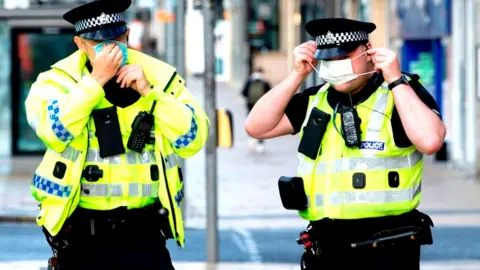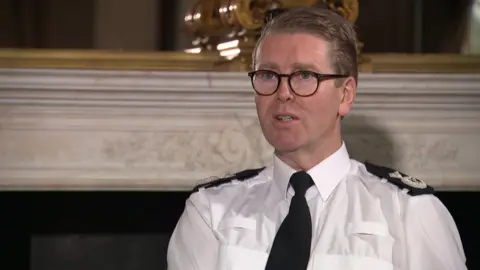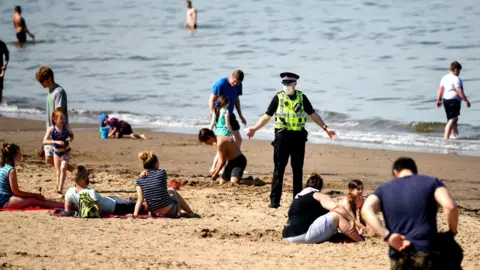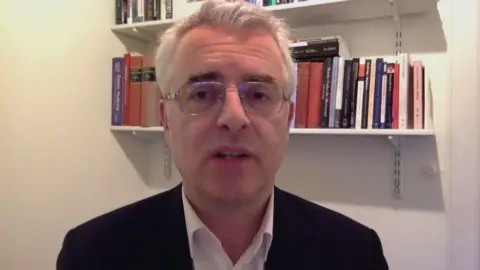Covid in Scotland: Public gives verdict on lockdown policing
 Getty Images
Getty ImagesOne of Scotland's top police officers says discretion and common sense are what made lockdown policing a success.
Police Scotland was given emergency powers in March last year to ensure the safety of the public during lockdown.
Now 33,000 people have reviewed the force's performance during the pandemic.
Deputy Chief Constable Will Kerr has told BBC Scotland the force "didn't seek" the extra powers and knew it had to had to tread carefully.
He said that at the start of the first lockdown police knew people would be frightened and that the unprecedented rules could have been perceived as draconian.
'Emptied back offices'
He said: "We knew very quickly we would have to focus on two things - we knew the public would be scared. This was totally unprecedented. They would be anxious, they would need reassured.
"So we tried to get as many police officers as possible out on to the streets as we possibly could to provide visibility and reassurance.
"We emptied a lot of back offices to put hundreds of extra officers out there in communities across Scotland.
"We police by public consent and the public would expect us to enforce with a bit of common sense and practicality. Even when it was unprecedented - these were powers we hadn't sought."
He said the key was not setting tight policy parameters for front-line officers and using the "four Es": Engage, explain, encourage and enforcement.

Since the new police powers were introduced, the force has been asking the public if they were getting it right. So far more than 33,500 people have responded and while they were reassured by the results they are not complacent.
More than half (58%) said they had confidence in policing in Scotland. And 85% said they felt safe in their local area.
Mr Kerr said that it has been a case of "trying to get the balance right".
He said: "We have been the front-facing interface with communities and we have watched that change over the months. When the rates are high the public want to see us doing more robust enforcement, when they are slightly lower people are more happy generally with the police response."
Crime has changed over the pandemic and while public space offences and retail crimes have dropped, officers are concerned about a rise in hidden crimes - like domestic violence and cyber crime.
 Getty Images
Getty ImagesOver the past 10 months, the force has been concerned about hidden harms within people's homes - the risk of potential digital harms - around child abuse and exploitation online and also financial fraud.
Mr Kerr said: "We are absolutely trying to make every effort we can to make people understand they are not alone even when they are in their own homes.
"It is inevitable that the longer people have to spend time in contained spaces the more there is a risk that vulnerable people can be exploited and abused and we can see rises in the types of crime that worry us. Our response is to make sure they know that help is there."
The police chief praised officers for going out to work at a time when other people have been asked to stay in their homes.
He said: "We are still asking police officers to go out in public in the same way others aren't. I think they have been absolutely remarkable. We are deeply proud of how they have stood up over the last 10 months."

Human Rights lawyer John Scott QC, who was commissioned by Chief Constable Iain Livingstone to review Police Scotland's use of the emergency powers, believes the force has struck the right balance.
He said: "Our conclusion is that Police Scotland have been using the powers where it has been proportionate and necessary on the far greater number of occasions.
"There were maybe some teething issues in the early stages but these were extraordinary new powers brought in without an awful lot of scrutiny and without much time for training and dissemination and in the early stages of the first lockdown both the police and the public made mistakes. These were good faith mistakes and these were all resolved."
Early mistakes included incidents of moving people along after resting on park benches. Mr Scott said it was a case of police officers not understanding the latitude of the guidance and being "a bit too strict" in their actions.
